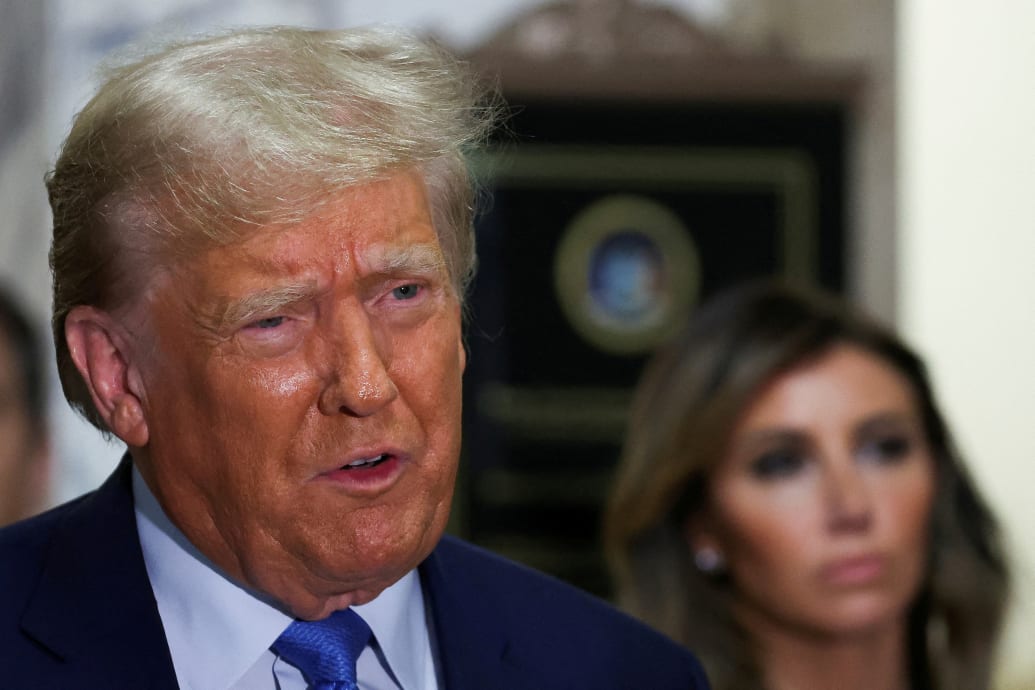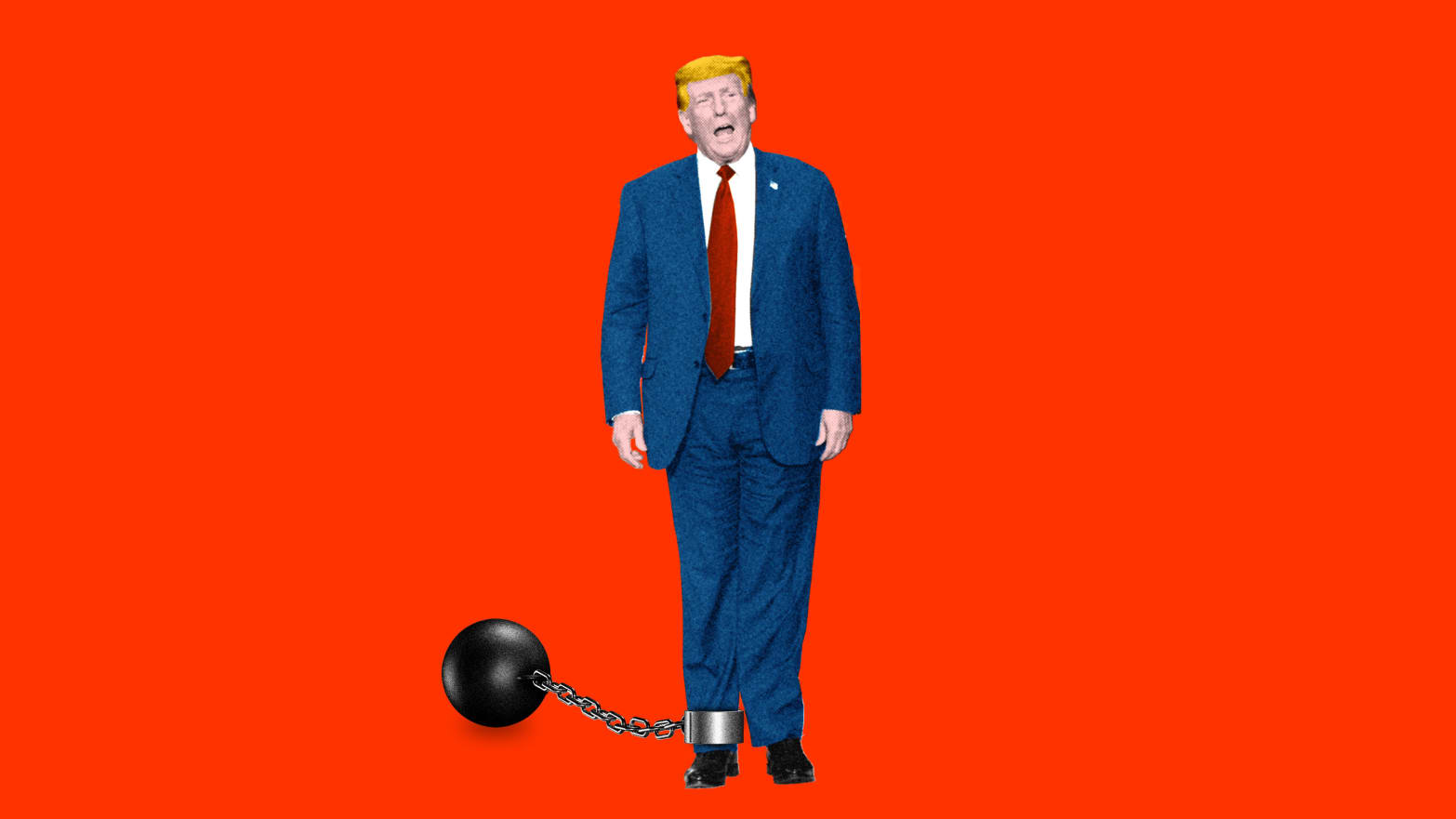The countdown is on for Donald Trump’s D.C. trial in March. And while Trump has faced jail threats over his inability to abide by gag orders with his recent bank fraud trial in New York, the charges he’s facing for his attempts at overturning the 2020 election are criminal in nature—and that means the federal judge overseeing the case has far greater power to punish Trump for not keeping his mouth shut.
The simple reason Trump may find himself in jail a lot sooner than he or anyone else thinks is because Trump shows hardly any restraint when it comes to speaking out about his trial, special prosecutor Jack Smith—who he now routinely refers to as “Deranged Jack Smith”—or court staff who he thinks are treating him unfairly.
While jailing Trump for disobeying a gag order would be a controversial move, it’s certainly not out of the question.
Trump has already proven his willingness to disobey gag orders, routinely flouting Judge Arthur F. Engoron’s dictates in New York. But with the D.C. case, his refusal to follow court orders could have a very different result than a meaningless financial penalty.
All eyes are now on U.S. District Judge Tanya Chutkan in Washington, with legal scholars wondering whether she’d take that dramatic step.
“I think by every indication, Judge Chutkan is well prepared for this. She’s not putting up with this,” said Catherine Ross, a professor emeritus at George Washington University Law School.
So far, online bets have been placed on whether or not Trump will be convicted and sentenced to prison. At BetOnline.ag, the odds are 4-1 that it’ll happen by the end of next year. But no one seems to be gambling yet on whether the former president will spend time in jail simply for running his mouth.
Trump has used his position of influence as the leading 2024 Republican presidential candidate to wage a war of words against the judiciary, deriding every case against him as a nefarious leftist plot to derail what his devoted followers see as his prophetic return to the White House. He has launched vicious attacks against prosecutors, judges, and court staff—even their family members.
That menacing threat has kicked judges into high gear—and of course, it’s not just D.C. where Trump may find himself in jail.
In Georgia, where Trump is accused of essentially running a mob-like operation to overturn the election there, a state judge has repeatedly stressed the need for Trump and his lieutenants to not misuse the law enforcement evidence they’re receiving from their lawyers as a weapon with which to intimidate witnesses.
But in New York, where Trump was on trial for nearly three months for lying to banks about his wealth, the threats and countermeasures came in real time. In the absence of any pre-imposed severe legal restriction, Trump blasted out totally false accusations about a supposed romantic relationship between a longtime political nemesis, Senate Majority Leader Charles Schumer (D-NY), and the judge’s law clerk, Allison Greenfield. Justice Arthur F. Engoron swiftly tried to shut him up with gag orders forbidding him from attacking court staff, but Trump found ways around those orders.

Former President Donald Trump leaves the courtroom after attending the Trump Organization civil fraud trial.
Shannon Stapleton/Reuters
What followed was tantamount to a petulant child testing his parents’ patience. Trump deleted the social media post in question, but didn’t take it down from his 2024 campaign website. He made vague references to the clerk in speeches outside the courtroom. And when the judge dragged him onto the witness stand to explain himself, Trump deflected by chalking it all up to a misunderstanding—an excuse that didn’t work and got him another $10,000 in fines, on top of the initial $5,000 fine for violating the gag order.
Engoron repeatedly warned Trump he’d face prison time if his behavior continued. At one point, Engoron warned that “this court is way beyond the warning stage.”
But that’s as far as it got. Engoron, through his remarks and body language, made it clear that he was cognizant of the severity that jailing a former president would bring. Had he done so, the first American president to be thrown behind bars would have landed there during a civil trial—an awkward construction that legal scholars say would have seemed out of place. After all, the bank fraud trial was focused on decade-old lies on paper, not some violent crime that posed a threat to the public.
“I don’t think that any judge is eager in any way,” Ross said. “The judge has enormous discretion to enforce these orders, but arguably, less than he would in a criminal case.”
But Trump’s upcoming trial in D.C. is different. In that case, he’s accused of weaponizing the enormous power of the presidency in a desperate bid to stay in office after losing the 2020 election—a crime that strikes at the soul of the nation’s democracy. Importantly, Trump’s words and actions led to the violent Jan. 6 insurrection. In effect, he’s already on trial for violating the bounds of what a president can say and do; allowing him to push those bounds further could have disastrous consequences as well.
The stakes are higher—and the threat of violence is boiling under the surface—when Trump attacks Justice Department Special Counsel Jack Smith, his documentary filmmaker wife, the federal prosecutors on the team, and follows up with vaguely ominous remarks about former political allies who are now slated to be key witnesses in the case. That’s why Judge Chutkan has already issued a gag order, prohibiting Trump from publicly targeting court employees, witnesses, or the special counsel’s team.
Trump is already pushing the bounds of that gag order with near-daily social media posts about Smith, an indication of his willingness to test Chutkan.
In separate orders, Chutkan has made clear that Trump no longer enjoys the power and immunity he once did as president—reminding him in one court order that his “four-year service as commander in chief did not bestow on him the divine right of kings to evade the criminal accountability that governs his fellow citizens.”
Chutkan’s harsh words haven’t been lost on legal experts.
“The judge in D.C. doesn’t seem like she is willing to tolerate a lot of nonsense,” said Paul Saputo, a Texas defense lawyer. “She seems like she is laying down the law. And I think there’s a real possibility that if he violates her order in a meaningful way, he could end up in jail. Obviously, that would blow everyone’s mind.”
If Chutkan goes that route, it appears she’ll have the backing of the appellate judges in her circuit.
On Dec. 8, her gag order was partially upheld by a three-judge D.C. appellate panel that voiced serious concerns about Trump’s ability to scare former Vice President Mike Pence from testifying against the man he once considered a friend. Their assessment of the danger shows that they recognize the perils of letting Trump run rampant.
“Some of Mr. Trump’s speech poses a significant and imminent threat to the fair and orderly adjudication of the criminal proceeding against him,” appellate judges wrote.
At this point, Trump is cornered. He faces 91 criminal charges in four states across the Eastern Seaboard that could land him in prison for years, and his real estate empire is on the verge of being forcefully yanked from his grasp over years of bank fraud. To top it all off, he is bracing for an expensive rape defamation trial next month that could siphon tens of millions of dollars from his bank accounts. (Trump was already caught moving millions of dollars recently to pay for the last iteration of that rape case, and this one could be significantly more expensive.)
But Trump also still commands a massive, cult-like political movement that has fully subscribed to his martyrdom fantasy, with his followers believing that any conviction is an illegitimate conspiracy. If anything, a stint behind bars would strengthen MAGA’s resolve.
Therein lies the danger for any judge, particularly if Trump manages to violate the gag order by making veiled threats and feigning ignorance—just like he did in New York.
“You can’t give him a list of things he can and can’t say. You have someone who is exceptionally good at flouting court orders by carefully choosing words to have some sort of arguable wiggle room. It will be difficult to enforce,” Saputo said. “She's going to have to exercise extreme caution. That would be the worst possible thing that could happen in this case. It would make Trump look like Nelson Mandela to his followers.”

